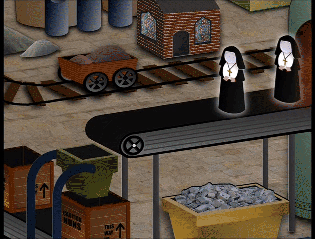It was with considerable regret that blues fans learnt yesterday of the sad loss of Fats Porker, who died in the early hours of the morning at his home in Florida.

Whilst Fats was never as famous as some of his contemporaries, nor indeed as influential, he was nevertheless reasonably well appreciated by certain sections of the music business and will be missed by several people all around the world.
Fats was born Mervyn P Conk in 1926. Like so many other great bluesmen he hailed from one of the deepest parts of the Deep South, a tiny little place called Crappsville. In fact Crappsville was so impoverished and insignificant that it couldn't even claim to be a one-horse town, although the locals did manage to scrape together enough to buy a one eighth share in a pig.
Not that this was of any great concern to young Fats. Although much of the surrounding countryside was firmly in the grip of poverty, Fats himself was fortunate enough to be born into one of the largest land-owning families in the state, and spent much of his childhood growing up in a twelve-bedroomed mansion, surrounded by hot and cold flowing money.
Such a privileged start in life should have made Fats a very contented child, but this was far from the truth. Fats was always a thoroughly wretched and miserable creature, who rarely gleaned any sort of enjoyment from life. Family friends say that as a baby he wore a perpetual scowl and that he started moaning as soon as he was able to talk.
"At that time my folks were living in a burnt out tram fourteen miles from the nearest toilet."
Art Stowe, whose grandmother was a servant for the family during the thirties, recalls that Fats never really wanted for anything.
"But in spite of that, old Fats sure was an ornery child," he says. "He was forever a-moping around the house, moanin' 'bout this, complainin' 'bout that. You could hear his caterwaulin' halfway down the block, wailin' that his egg wasn't done properly, or his bath water was too hot. At that time my folks were living in a burnt out tram fourteen miles from the nearest toilet, and frequently we had nothing else to eat but each other. So, I guess I didn't really have much sympathy for the guy."
At the age of fourteen, doctors finally diagnosed Fats with a severe case of the blues. These days such aberrant mental conditions can be cured quite easily by hard drugs or daytime television, but back then reality TV hadn't been invented, so instead the family were advised to get young Fats a guitar.
Easier said than done, despite the family's wealth. This was the thirties, during the great furniture shortage, and the government had recalled most of the guitars in the country so they could be melted down and turned into sideboards.
Nevertheless, Fats' father, Mervyn Conk Snr, learned that a gentleman by the name of Wandering Bill Mulepoker had arrived in Crappsville. Wandering Bill was an itinerant minstrel and spoon bender, who travelled from town to town, earning a few cents by entertaining the local hicks.
Conk Snr learned that he was playing down at the Crappsville Spittoon Parlour, and so he got together a bag full of cash and went down there to buy his guitar from him. Unfortunately, Wandering Bill refused to part with the instrument, claiming that it was of sentimental value. Mervyn Conk Snr was not the sort of man who was accustomed to taking no for an answer, and so he went and found a couple of roughnecks and offered the cash to them instead, in return for giving Wandering Bill a sound working over and stealing the guitar.
Fats somehow learned how to coax something approaching music from this pile of junk.
The next morning, Mervyn Conk Snr presented his son with the battered and bloodstained instrument. Fats greeted it with his customary surly indifference. It was, at first glance, a pretty sorry-looking item. It only had two strings, the neck was splintered and held together with duct tape, one of the tuning nipples was broken and the sound flaps were riddled with dry rot.
Nevertheless, Fats' initial curiosity grew into fascination for the instrument, then finally blossomed into love. He named the guitar 'Mary Lou' and he took it everywhere with him. It became more than just an instrument, it became a friend, a lifelong companion. And with practice, determination and bull-headed obstinacy, Fats somehow learned how to coax something approaching music from this pile of junk.
It was during those years that Fats perfected his unique performing style. "I seem to remember," Art Stowe recalls, "some music industry guy once called Fats' music 'one long heartfelt melancholy sigh'. Now, that sure is a pretty description but I'm guessing that feller had something mighty wrong with his ears, 'cos it certainly don't bring to mind the whining and snivelling that I remember.
"Fats would take to wanderin' round the house, strumming that old guitar, a-screamin' and a-bawlin' and drivin' his poor folks to distraction. Pretty soon they were wishin' they'd never given him that damn guitar."
He had no option but to leave the family home and go and live in a swamp.
With little encouragement from his parents, Fats began to feel more and more solitary and unappreciated, and it drove him to spend more and more time practising with Mary Lou. This isolation was a common theme amongst the songs he began to write at the time. He was lapsing deeper into misery and despair, and soon the luxury and ease of his life began to stifle him. He had no option but to leave the family home and go and live in a swamp.
It was a considerable culture shock for young Fats. Life was hard in the swamp. Shelter was scarce, food was damp and he was constantly being bitten in the ass by alligators. But Mary Lou would see him through. Not only did his trusty two-stringed guitar keep him company though those hot, humid nights, but she also provided the means by which Fats could put food on his table.
Every day Fats would trudge seven miles to the nearest highway and stand at the crossroads playing the blues for passing farmers. There was no money to be had, but appreciative passers-by would often reward his efforts with gifts of pork bellies, moonshine or grits. He was singing for his supper, and it was his first indication that he might be able to forge himself a career as a bluesman.
It was a time of his life that he would remember with great fondness in the song 'Standing at the Crossroads Playing the Blues in Return for Pork Bellies, Moonshine and Grits'. Fats never released the song as a single himself, but it was later made famous when Eric Clapton covered it in the early seventies.
The swamp was bought up by a European furniture wholesaler
Fats adjusted quickly to his new life in the swamp, and although it would be wrong to describe his time there as 'happy', it's fair to say that he would have been content to live out the rest of his days there. Sadly, that was not to be.
The economy of the area was beginning to see a distinct upturn and many new industries were moving into the region. The swamp was bought up by a European furniture wholesaler, which drained it and built an open plan warehouse unit. Fats suddenly found himself homeless.
Fats had no option but to hit the road. With his faithful Mary Lou by his side, he moved from town to town, getting the odd job here and there, or playing the blues in return for lodgings and food.
He was like a one-man wave of misery sweeping across the country, until finally he pitched up in Memphis where he was fortunate enough to land a job pushing broom at a greetings card company. After six months he had pushed it over two hundred miles and when the police finally caught up with him they did him for broom theft.
Fats was sentenced to three months in prison - and these turned out to be he happiest three months he'd known since he had left the swamp. He loved the sense of hopelessness, the despondency and the buckets. The experience gave him further inspiration for his music, most apparent in the classic 'Slop Out Blues', which was to become a live favourite. It was also whilst he was in prison that he had his first fortuitous meeting with Buddy Scrote.
Doing time for marrying an underage dog
Scrote was an old lag and had been in and out of prison many times before. He even had his own parking space. When Fats Porker first met him he was doing time for marrying an underage dog. He knew the prison routine - the people to know, the people to avoid, the best places to eat - and he was able to help Fats through his first few difficult months.
More importantly, Scrote was a semi-professional musician with contacts in the industry and after their release he took Fats along to a local recording studio called Swampdiscs. Studio boss Elmore 'Rubber' Johnson was not too impressed with Fats' musical talent, being considerably more interested in his previous experience as a cleaning operative. He offered Fats a six-month contract and a brush. Basically, the deal was that Fats would be responsible for keeping the studio clean and in return he would be able to utilise the facilities when they weren't being used by other artists.
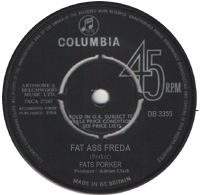
Whilst this seemed like the ideal opportunity, Swampdisc's studio was actually much in demand and the time available to Fats was limited. Nevertheless, in those days recording techniques were simpler and the process of laying down a track was much faster. Fats actually managed to record his first album in just twenty minutes - ten minutes shorter than the actual running time of the record itself.
When he finally presented Elmore Johnson with his finished recordings, Johnson was so impressed that he agreed to release the album on his own label entirely for free - in return for one hundred per cent of the proceeds.
Only three copies are known to have been pressed
Fats agreed and his first single, 'Turkey Neck Stomp', was released in March 1957. The record was not a great success, largely due to its limited availability. In fact, only three copies are known to have been pressed.
The follow up single, 'Southern Piles', did noticeably better, and it even managed to get some airplay on a number of local radio stations. This meant that by the time the album came out many blues fans were already familiar with the name Fats Porker.
What followed was a brief run of moderately successful singles. Fats Porker began to get something of a reputation and quickly came to the attention of company executives at Columbia Records. They were keen to sign up new, easily exploited acts, and they were very impressed when they heard that Fats Porker was not earning a single cent from his records.
They approached him with an offer he couldn't refuse, guaranteeing to triple what Swampdiscs were paying and considerably increase his profile in the marketplace. Effectively, they would still pay him nothing, but they would expose his work to a much larger audience.
It remained on the Billboard Top Ten due to a clerical error
Fats agreed, and so he and the ever-faithful Mary Lou travelled all the way across the street to Columbia Records. His first single for the label, 'Two O'clock Shits' was a disappointing seller, but notorious in that it was banned in fourteen states. It was the follow up that really put Fats on the map. 'I'm Gonna Love You Till You Pop' proved to be the biggest single of his career, and remained on the Billboard Top Ten for over six months, due to a clerical error. It's still the single by which he is best remembered today.
It marked the start of Fats Porker's most successful period. More importantly, it was the first time he teamed up with piano player Long John Boogie - so called because of his habit of recording in his underwear.

Long John had gone down with an extreme case of boogie-woogie at the age of six, which had left him in a state of 'rhythmic hypertension'. These rhythms would build up in his body and could easily shake him to pieces if he was not able to vent them on a piano keyboard. Unfortunately, over the years his excessive piano playing had taken its toll on his hands and surgeons had been forced to replace the worn ends of his fingers with lead tips.
Fats found he had a great deal in common with the legendary piano player. Long John's unique, crisp playing style combined perfectly with Fats' two-stringed guitar, and he featured on many of Fats' recordings. In return, Fats played on many of Long John's records and was much acclaimed for his contribution to the seminal 'Leadfingers' album.
The second shot ricocheted off his lead thumb
It seemed like everything was going well for Fats, but as is sadly so often the case, the success couldn't last forever. For Fats Porker the dream ended very abruptly.
Shortly after the release of his 1965 album 'Another Man's Shoes', Fats returned home from a furniture convention to find Long John in bed with Mary Lou. Horrified and dismayed at being betrayed by both his best friend and his beloved guitar, Fats went out and got his shotgun and fired off two cartridges at the frantically protesting Long John.
The first shot missed but the second ricocheted off his lead thumb and went straight though Mary Lou's neck. Neighbours raised the alarm, and when police arrived at the scene minutes later they found a distraught Fats Porker cradling the broken guitar.
There was nothing that could be done. Mary Lou was gone and at the subsequent trial Fats was sentenced to six years hard labour for guitaricide. When he was eventually released in 1971 the music scene had moved on. There was a new spirit in the air, a mood of upbeat optimism and there was simply no room for the disconsolate whinging of Fats Porker.
Fats Porker's music had died when Mary Lou got it in the neck
But he persevered. Fats bought himself a new guitar, which he christened Jo Beth. He managed to get the odd gig here and there, but it simply wasn't the same and he soon came to realise that he would never again recapture the soulful, almost spiritual tones of his first love. Fats Porker's music had died when Mary Lou got it in the neck.
With nothing else to fall back on, Fats had no choice but to struggle on and somehow he managed to scrape by. He even enjoyed a brief return to the spotlight in 1975 when a one-off novelty single became his first record to get to number one. But 'Grumpy Stumpy McPumpy' was nothing more than a lewd comedy song, and ultimately did nothing to restore either his fortunes or his reputation.
Similarly disappointing was his attempt four years later to cash in on the disco craze, which saw him release his first album of new material in fourteen years. 'Fats Goes Disco!' only served to damage his credibility even further and the single, 'Disco Up My Funk Hole' failed to chart.

Fats was sunk. The gigs dried up completely and he was forced to scrape a living by collecting grit for the local highways department. Then one day he got an unexpected phone call inviting him to make a cameo appearance in a new movie called 'The Blues Brothers'. The film was a cult hit and did much to reawaken the public's interest in Fats Porker. His old albums began to sell, he started to get bookings again and he was even asked to guest on a new album by the Rolling Stones.
Singing crabs
Then, in 1985, his classic single 'I'm Gonna Love You Till You Pop' was used as the soundtrack to a jeans advert. The song was re-released and the quirky animated video - featuring a Plasticine Fats Porker dancing around on a desert island with a group of singing crabs - helped the single become a smash hit all over again. Not only that, but thanks to a renegotiated contract Fats was at last receiving royalties from his songs, and a subsequent greatest hits album earned him some serious cash.
With his new wealth, Fats was at last able to do something he had always dreamed of. He moved to Florida, bought himself a big house, tore it down and built a swamp. And it was here that he was to spend the remainder of his life.
During the late eighties and nineties he was occasionally coaxed out of retirement to perform the odd gig or appear on the occasional TV show, but for much of the time he was content to just sit and sulk. Acquaintances say that he spent most of his days in mournful reminiscences of his heyday, and in melancholy memories of Mary Lou, his one true love. Gradually he slipped deeper and deeper into unhappiness and self-pity, turning his back on the outside world and shunning friends and family.
There was some talk of a return to music in recent months, and it was even suggested that he might record some new material with Eminem, but this was not to be. Doctors were called to his home early yesterday morning, but by the time they got there it was too late. And the cause of death? Perhaps fittingly for a man of such legendary pedigree, Fats Porker's death certificate records that he died of the blues. He leaves three dressing tables, two wardrobes and a banjo.

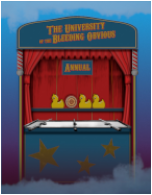


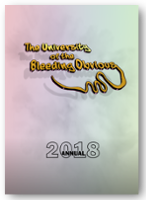
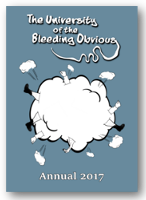




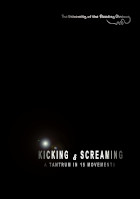
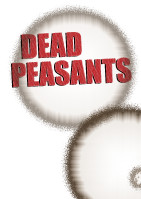








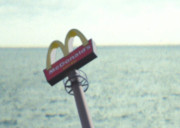 McDonald's opens new branch in the Atlantic
McDonald's opens new branch in the Atlantic Digital Vicars
Digital Vicars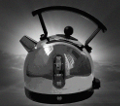 National Consumer Instructions Awards
National Consumer Instructions Awards World of Holes
World of Holes Songs of Inspiration and Devotion
Songs of Inspiration and Devotion Are You Ready for The Drivelling?
Are You Ready for The Drivelling? Blood Donors
Blood Donors The British Gas Party
The British Gas Party Alps
Alps Strawberries
Strawberries